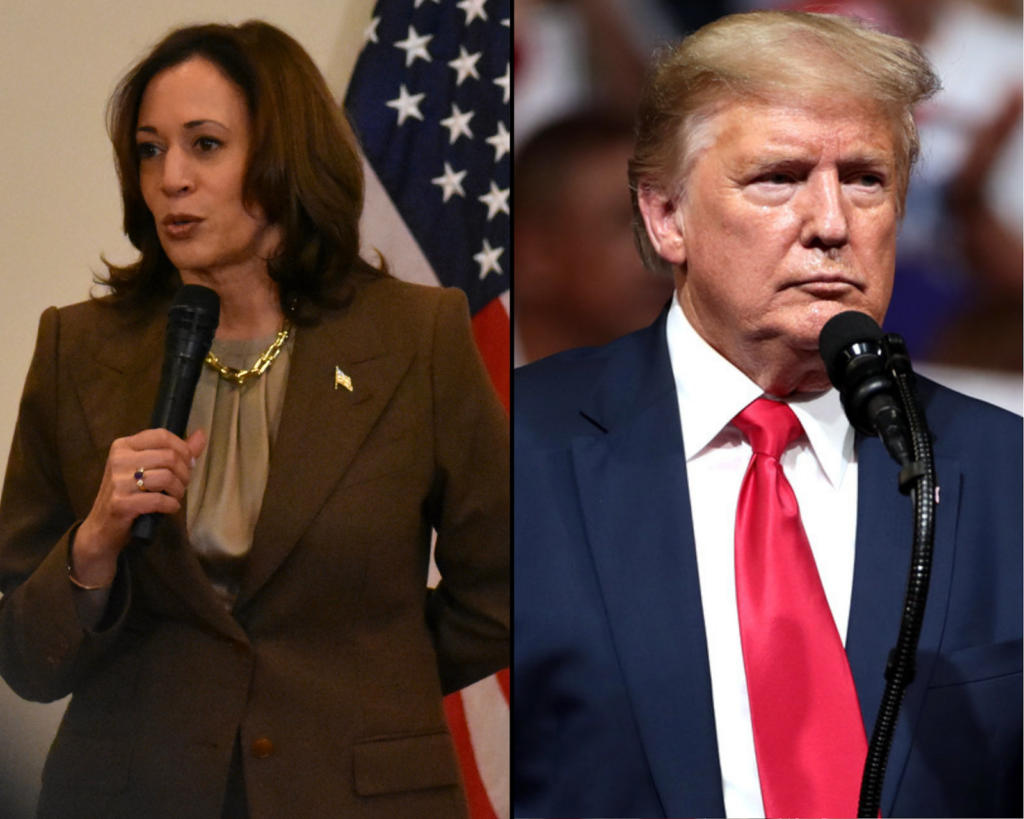
Every four years, Americans have the choice to vote for the next president of the United States. With only 72 days until election day, stakes are incredibly high for the majority candidates and their supporters. This alludes to an important question: how are Kamala Harris and Donald Trump doing in the polls?
Research company Ipsos conducted multiple polls illustrating America’s preferences on a variety of issues. The survey took place from Aug. 9 to Aug. 13, using a nationally representative probability sample of 2,336 adults 18 and over.
Notably 66 participants were removed from the data due to refusing to answer 50 percent or more of all questions or completing the survey within two percent of the fastest compilation durations.
According to Ipsos, Americans were more satisfied with Harris and Trump as the majority candidates than they were in July with Biden and Trump.
Generally, half of Americans would be satisfied or enthusiastic if Harris is elected, while 45 percent would be satisfied or enthusiastic if Trump is elected.
Ipsos breaks their poll findings down into sections, identifying what voters say are the most important issues this election season. The economy and inflation are classified as America’s two main issues, according to Ipsos.
Voters categorized protecting American democracy, health care, crime and safety, Mexico-American border issues, and appointments to the Supreme Court as second-tier priorities.
The polls show that Trump has a nine-point lead over Harris with the economy and inflation, and a 10-point lead on the US-Mexican border issue.
On the contrary, it shows that more Americans trust Harris to protect American democracy, and with appointments to the Supreme Court with six and five-point leads respectively.
Gerald E. Daniels, a professor in the economics department at Howard University said that although Harris is leading in the overall poll, Americans want Harris to continue policy discussions on a variety of economic issues.
“I suspect many Americans are interested in Harris’ continued policy discussions on reducing overall inflation, home and rent prices, and her proposed tax policies, which may impact the polling on these issues, assuming inflation continues to cool,” Daniels said.
Other presidential qualifications that were evaluated include mental sharpness & physical fitness, trustworthiness, and representation.
The polls indicate Americans believe that Harris’ mental sharpness and physical fitness to be president are better.
Furthermore, Harris is viewed as more trustworthy than Trump by a 15-point margin in the polls, perceived by Americans to better understand the problems of people like them, and represent their personal values.
Eleanor M. King, an anthropology professor in the department of sociology and criminology at Howard University believes that Harris should address the needs of certain audiences and demographics.
“I think her biggest challenge this election year on an international level is addressing and appealing to the Palestinian Americans, and people who support the Palestinian cause,” King said.
Some Americans have looked at the Biden-Harris administration with disdain for maintaining America’s decades-long allyship with Israel and sending billions of dollars worth of aid and weapons to Israel since Oct. 7.
This disdain was apparent on Aug. 7, when pro-Palestine protests interrupted Harris during her speech at a Michigan campaign rally.
Demonstrations in front of the White House have also taken place, with protestors accusing Israel of genocide while condemning the Biden administration’s complicity.
Over the past 10 months, more than 40,000 Palestineans in Gaza have been killed as a result of Israel’s bombing campaign and assault on the region, according to an article published by AP News.
The youth and marginalized vote has also been a crucial component of Harris’ presidential run for some voters.
Dr. Richard Seltzer, a professor in Howard University’s department of political science, expressed that energizing the youth and marginalized vote is needed for her to win.
“She has energized the youth vote much more than what you had with Biden,” Seltzer said. “There’s been a dramatic change, just before Biden dropped out of the race most of the new younger voters coming in were actually registered as Republicans and that apparently has been reversed substantially.”
In terms of the candidates’ running mates, Americans have mixed opinions.
52 percent of Americans approve of Minnesota Governor Tim Walz as Harris’ running mate, while 44 percent disapprove. 45 percent of Americans approve of Ohio Senator JD Vance as Trump’s running mate, while 50 percent disapprove.
When asked whether or not the public’s perception of a presidential candidate’s running mate is important to win an election, Seltzer said that historically running mates could have either negative effects or little to no effects on the election’s outcome.
“This is probably one of those cases right now, JD Vance’s negative ratings are extraordinarily high and Walz’s are not,” Seltzer said.
Although negative public perception of Trump’s running mate JD Vance could potentially affect Trump’s campaign, it’s hard to estimate how severely it will affect Trump’s campaign.
On July 21, the road to the 2024 election took a shocking turn: Biden dropped out of the race.
His withdrawal came after multiple calls from Democrats asking him to step down. CBS News curated a list of the Democrats who called for Biden to step aside, due to his age and performance during the first presidential debate.
With endorsements from Biden, former President Barack Obama, and others, Harris stepped up as the Democratic presidential nominee. Republican nominee Trump looks to serve a second term in office after losing the 2020 presidential election.
On Sept. 10, Harris and Trump will spar in the second presidential debate at the National Constitution Center in Philadelphia. While this is the second presidential debate this election season this will be Harris’ first due to Biden’s withdrawal.
Copy edited by Camiryn Stepteau

